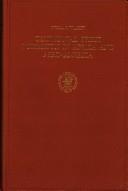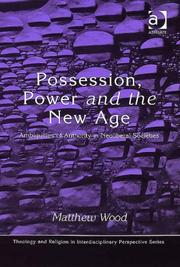| Listing 1 - 10 of 73 | << page >> |
Sort by
|
Book
ISBN: 1412366011 Year: 2008 Publisher: Chicoutimi : J.-M. Tremblay,
Abstract | Keywords | Export | Availability | Bookmark
 Loading...
Loading...Choose an application
- Reference Manager
- EndNote
- RefWorks (Direct export to RefWorks)
Book
ISBN: 9782940516964 Year: 2019 Publisher: Lausanne : BSN Press,
Abstract | Keywords | Export | Availability | Bookmark
 Loading...
Loading...Choose an application
- Reference Manager
- EndNote
- RefWorks (Direct export to RefWorks)
Religion. --- Spirit possession. --- Tanzania --- Zanzibar
Book
ISBN: 3110670038 311066934X Year: 2022 Publisher: Berlin ; Boston, MA : Walter de Gruyter GmbH,
Abstract | Keywords | Export | Availability | Bookmark
 Loading...
Loading...Choose an application
- Reference Manager
- EndNote
- RefWorks (Direct export to RefWorks)
The series Ekstasis publishes monographs and collected essays on topics concerning religious experience from Antiquity to the Middle Ages. Volumes in this series will address a diverse array of movements and particular expressions of religious experience, such as ecstatic trances, magic, healing, prophecy, divination, and dreams, as well as other phenomena. Methods will range widely, encompassing contemporary sociological, anthropological, and psychological approaches, as well as historical analysis of textual, archaeological, and artistic evidence.
Spirit possession --- Spirit possession. --- Judaism. --- Bible. --- Criticism, interpretation, etc. --- Hebrew Bible. --- Second Temple Judaism. --- demons. --- spirit possession.
Book
ISBN: 1412365430 Year: 2008 Publisher: Chicoutimi, Quebec : J.-M. Tremblay,
Abstract | Keywords | Export | Availability | Bookmark
 Loading...
Loading...Choose an application
- Reference Manager
- EndNote
- RefWorks (Direct export to RefWorks)
Academic writing. --- Spirit possession. --- Gaddis (Indic people)

ISBN: 9004035842 9004671269 Year: 1972 Volume: 4 Publisher: Leiden : Brill,
Abstract | Keywords | Export | Availability | Bookmark
 Loading...
Loading...Choose an application
- Reference Manager
- EndNote
- RefWorks (Direct export to RefWorks)
Book
ISBN: 9780226122625 022612262X 9780226122762 022612276X Year: 2014 Publisher: Chicago (Ill.) : University of Chicago press,
Abstract | Keywords | Export | Availability | Bookmark
 Loading...
Loading...Choose an application
- Reference Manager
- EndNote
- RefWorks (Direct export to RefWorks)
The word "possession" is anything but transparent, especially as it developed in the context of the African Americas. There it referred variously to spirits, material goods, and people. It served as a watershed term marking both transactions in which people were made into things - via slavery - and ritual events by which the thingification of people was revised. In Spirited Things, Paul Christopher Johnson gathers together essays by leading anthropologists in the Americas that reopen the concept of possession on these two fronts in order to examine the relationship between African religions in the Atlantic and the economies that have historically shaped - and continue to shape - the cultures that practice them. Exploring the way spirit possessions were framed both by material things - including plantations, the Catholic church, the sea, and the phonograph - as well as by the legacy of slavery, they offer a powerful new way of understanding the Atlantic world. -- from back cover.
Afro-Caribbean cults. --- Spirit possession --- Blacks --- Spirit possession. --- Afrokaribischer Kult. --- Besessenheit. --- Religion --- Religion. --- Latin America.

ISBN: 0231137486 9780231137485 0231510659 9780231510653 1283008939 9786613008930 9781283008938 6613008931 Year: 2006 Publisher: New York Columbia University Press
Abstract | Keywords | Export | Availability | Bookmark
 Loading...
Loading...Choose an application
- Reference Manager
- EndNote
- RefWorks (Direct export to RefWorks)
The Self Possessed is a multifaceted, diachronic study reconsidering the very nature of religion in South Asia, the culmination of years of intensive research. Frederick M. Smith proposes that positive oracular or ecstatic possession is the most common form of spiritual expression in India, and that it has been linguistically distinguished from negative, disease-producing possession for thousands of years. In South Asia possession has always been broader and more diverse than in the West, where it has been almost entirely characterized as "demonic." At best, spirit possession has been regarded as a medically treatable psychological ailment and at worst, as a condition that requires exorcism or punishment. In South (and East) Asia, ecstatic or oracular possession has been widely practiced throughout history, occupying a position of respect in early and recent Hinduism and in certain forms of Buddhism. Smith analyzes Indic literature from all ages-the earliest Vedic texts; the Mahabharata; Buddhist, Jain, Yogic, Ayurvedic, and Tantric texts; Hindu devotional literature; Sanskrit drama and narrative literature; and more than a hundred ethnographies. He identifies several forms of possession, including festival, initiatory, oracular, and devotional, and demonstrates their multivocality within a wide range of sects and religious identities. Possession is common among both men and women and is practiced by members of all social and caste strata. Smith theorizes on notions of embodiment, disembodiment, selfhood, personal identity, and other key issues through the prism of possession, redefining the relationship between Sanskritic and vernacular culture and between elite and popular religion. Smith's study is also comparative, introducing considerable material from Tibet, classical China, modern America, and elsewhere. Brilliant and persuasive, The Self Possessed provides careful new translations of rare material and is the most comprehensive study in any language on this subject.
Spirit possession --- Spirit possession in literature. --- Sanskrit literature --- Tantrism --- History and criticism. --- Hinduism. --- Sanskrit literature - History and criticism. --- Sanskrit literature -- History and criticism. --- Spirit possession - Hinduism. --- Spirit possession -- Hinduism. --- Spirit possession - South Asia. --- Spirit possession -- South Asia. --- Tantrism - South Asia. --- Tantrism -- South Asia. --- Spirit possession in literature --- Religion --- Philosophy & Religion --- Hinduism --- History and criticism --- Possession, Spirit --- Tantricism --- Tantrism, Hindu --- Experience (Religion) --- Magic --- Mysticism
Book
ISBN: 3610007303 Year: 1987 Publisher: Frankfurt am Main : Athenäum,
Abstract | Keywords | Export | Availability | Bookmark
 Loading...
Loading...Choose an application
- Reference Manager
- EndNote
- RefWorks (Direct export to RefWorks)
Art, African. --- Europeans in African art. --- Spirit possession --- History
Book
ISBN: 0897890205 Year: 1983 Publisher: South Hadley (Mass.) : Bergin and Garvey,
Abstract | Keywords | Export | Availability | Bookmark
 Loading...
Loading...Choose an application
- Reference Manager
- EndNote
- RefWorks (Direct export to RefWorks)
Cults --- Hausa (African people) --- Spirit possession. --- Trance. --- Religion. --- Spirit possession --- Trance --- Altered states of consciousness --- Possession, Spirit --- Experience (Religion) --- Religion

ISBN: 075463339X 9780754633396 9781315601588 9781317077572 9781317077589 Year: 2007 Publisher: Aldershot, England: Ashgate,
Abstract | Keywords | Export | Availability | Bookmark
 Loading...
Loading...Choose an application
- Reference Manager
- EndNote
- RefWorks (Direct export to RefWorks)
This book provides a new sociological account of contemporary religious phenomena such as channelling, holistic healing, meditation and divination, which are usually classed as part of a New Age Movement. Drawing on his extensive ethnography carried out in the UK, alongside comparative studies in America and Europe, Matthew Wood criticises the view that such phenomena represent spirituality in which self-authority is paramount. Instead, he emphasises the role of social authority and the centrality of spirit possession, linking these to participants' class positions and experiences of secularis
New Age movement. --- Spirit possession. --- Authority. --- New Age movement --- Spirit possession --- Neoliberalism --- Islam --- Religion --- Philosophy & Religion --- Social aspects --- Religious aspects --- Social aspects.
| Listing 1 - 10 of 73 | << page >> |
Sort by
|

 Search
Search Feedback
Feedback About UniCat
About UniCat  Help
Help News
News